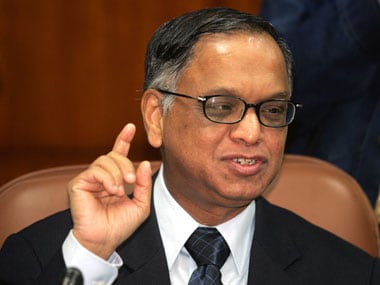Have the raging fires in the public space over corporate governance at Infosys died down with the appointment of co-founder Nandan Nilekani as non-executive chairman? That is what NR Narayana Murthy, who along with others set up the company and kicked up the recent controversy, seems to be hoping. “I wish Nandan the best of everything in his effort to bring back acche din to Infosys,” said Murthy in a conference call with investors on Tuesday. With the return of Nilekani will the issues raised by Murthy be taken care of? Analysts who spoke with Firstpost said the whole problem that Murthy had with the former CEO Vishal Sikka and board headed by R Seshasayee boiled down to an anonymous whistleblower’s letter. Among the issues the letter raised were the acquisitions that were alleged to be over priced, including that of Panaya and higher severance payment to former CFO Rajiv Bansal. The letter was sent to the Securities and Exchange Board of India (Sebi). The board had instituted a forensic audit of the issues raised, which found no wrongdoing on the part of any of the company’s executives. However, the company did not make the entire audit report public. Murthy, however, asked why was the company not making the report public. In his call with the investors, Murthy went back to the letter. In the first briefing with the investors and the media after being appointed as the non-executive chairman, Nilekani had made it clear that all the investigations will be studied before taking any action. He did not answer pointed questions whether the forensic audit report will be made public. What does Murthy want from Infosys? Is it only a question of his vision? The issue is simple, said JN Gupta, former executive director of Sebi. “Murthy is not ready to believe anyone than an anonymous whistleblower. The board said that the allegations were investigated and found to be wrong but he does not believe it. Will Nilekani put out the contents of the report as Murthy asked for it from the previous board members? If the report points out that Seshasayee and his team did something unethical, then one can say the allegations made against the board were right. Until then, no one can cast aspersions on Seshasayee and team,” he said. The co-founders and their family hold 12.75 percent stake in Infosys. The majority stake is held by other shareholders. “Viewed from this perspective, one wonders if the large majority’s happiness is not of any consequence except the co-founders,” said an analyst. [caption id=“attachment_832847” align=“alignleft” width=“380”]  N R Narayana Murthy, co-founder, Infosys. Reuters[/caption] “There are two aspects: corporate governance and transparency. If the issues flagged off by the founders in the case of Infosys are being done in an opaque manner, then it is their right to bring focus to it,” said Manoj Kumar, founder – Hammurabi & Solomon and visiting fellow at Observer Research Foundation, adding that constant needling of the board’s decision in the public space was unnecessary though. The public spat does not bode well for the Indian corporate sector and is a bigger cause for worry, concurs Professor Amit Nandkeolyar, assistant professor of organisational behavior, Indian School of Business, Hyderabad. “What is not clear with regard to Infosys is the degree of separation between professional leadership and founders. What is the role of the manager and owner at Infosys? What is the responsibility and accountability of each of them is not laid out,” he said. Analysts aver that Murthy’s contribution to Infosys deserves kudos. It was because of him and other co-founders that Infosys is now a globally recognised firm. But when the co-founders keep coming back instead of moving on, then it undermines the authority of the CEO. Who is in control then, asked an analyst. “Is it Sikka who has to report to the board or the superboard in the form of the co-founders?” Murthy had, in his investor conference, listed out the achievements when he was requested to helm Infosys in 2013. True, that doesn’t make the cut. “First, the situation and environment of the IT industry back then and now are different. The industry has also received passive support from the government,” said the analyst. Now the sector is facing multiple challenges of automation, robotics, and protectionism in the developed economies. The companies are fire-figting at all levels. “The past achievements cannot help in the present as the situation is different. For that matter, some companies like Kodak, Nokia, Blackberry were great companies of their times. But they are no longer on the scene as the future is different from these firms great past. You can celebrate the past but the query is: Is Infosys prepared for the future?” another analyst asked. What happened at Infosys with Sikka and a few of the previous board members who have since resigned amounted to personality and legacy issues, industry observers said. “A culture clash was inevitable when Infosys brought on a professional to lead the company from outside. One transition happened when Sikka was brought in and another when he resigned. All this could have been avoided if the co-founders had spoken with the board and Sikka in the boardroom instead of letting it spill in the media. Isn’t that corporate governance about,” said an industry veteran. Manoj Kumar said the CEO is answerable to the board and not to the promoter or co-founder. When co-founders and promoters go for the overkill, then that is not corporate governance, he says. Gupta says that corporate governance does not bring glory to a company on its own if it is not matched with a good performance which only can come from team work. “Sikka and the board spent his time having to respond to Murthy’s accusations. Yet, it is to their credit that it did not affect the company’s performance with SIkka at the helm,” said Gupta. Analysts feel that it seems the co-founders feel ‘safe’ when one of their ilk is leading Infosys like Nilekani is now doing. Then, they said, it would have been better for the co-founders to have not left at all and continued working at intermittent intervals each donning the role of the CEO. Perhaps with Murthy at peace and with Nilekani at the helm, there will be no more spats in the public space about the company and it can focus on its growth strategy.
Narayana Murthy and the Infosys board should remember that corporate governance does not bring glory to a company on its own if it is not matched with good performance which only can come from team work
Advertisement
End of Article


)

)
)
)
)
)
)
)
)



